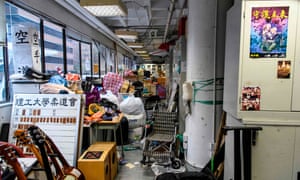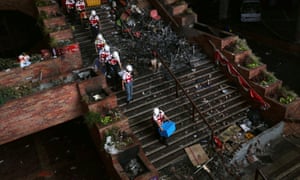It took a lot of courage for Peter Lui to go down the sewage drain – but he thought it was better than surrendering to the police who had besieged Polytechnic University in Hong Kong.
Now, instead of celebrating his successful escape a few days ago, he has become despondent. After returning home, he burned all his protective gear and swore he would have nothing to do with the anti-government movement that began almost six months ago.
“I won’t care any more. I am utterly disappointed,” said Lui, who was the last of his group to leave. One was arrested, one escaped and two turned themselves in, he said. Lui is critical of the large numbers of fellow protesters who surrendered to police.
A new Hong Kong extradition law is proposed, which would allow people to be transferred to mainland China for a variety of crimes. Residents fear it could lead to politically motivated extraditions into China's much harsher judicial system.
Large public demonstrations start as thousands march in the streets to protest against the extradition bill.
Hong Kong's leader, Carrie Lam, introduces concessions to the extradition bill, including limiting the scope of extraditable offences, but critics say they are not enough.
The scale of protests continues to increase as more than half a million people take to the streets. Police use rubber bullets and teargas against the biggest protests Hong Kong has seen for decades.
Lam says the proposed extradition law has been postponed indefinitely.
The protests continue as demonstrators storm the Legislative Council, destroying pictures, daubing graffiti on the walls and flying the old flag of Hong Kong emblazoned with the British union flag. The protests coincide with the 22nd anniversary of the handover of Hong Kong from the UK back to China.
Armed men in white T-shirts thought to be supporting the Chinese government attack passengers and passers-by in Yuen Long metro station, while nearby police take no action.
44 protesters are charged with rioting, which further antagonises the anti-extradition bill movement.
By now the protest movement has coalesced around five key demands: complete withdrawal of the proposed extradition bill, withdrawal of the use of the word "riot" in relation to the protests, unconditional release of arrested protesters and charges against them dropped, an independent inquiry into police behaviour and the implementation of genuine universal suffrage.
The first charges are brought against protesters for covering their faces, after authorities bring in new laws banning face masks in order to make it easier to identify or detain protesters.
Chan Tong-kai, the murder suspect whose case prompted the original extradition bill is released from prison, saying that he is willing to surrender himself to Taiwan. The extradition bill is also formally withdrawn, a key demand of protesters.
Chow Tsz-lok, 22, becomes the first fatality of the protests. Chow, a computer science student at the Hong Kong University of Science and Technology (HKUST), was found injured in a car park in Tseung Kwan O in Kowloon, where he was believed to have fallen one storey. Protesters had been trying to disrupt a police officer’s wedding, which was being held in the area. A week later a 70-year-old cleaner who is thought to have been hit by a brick during a clash between protesters and pro-Beijing residents becomes the second person to die.
“What kind of ‘militant’ protesters are they? They surrendered!” he said. “If they’re afraid of autocracy, then don’t come out to fight! Where is their determination? Democracy doesn’t fall from the sky. You have to make sacrifices to fight for it.”
By Wednesday, the university stood almost empty. More than 1,100 are said by police to have left the campus after having their identities registered. Dozens are believed to have escaped. The campus was reported to be in a bad condition as rotten food and rubbish gave off a foul smell and abandoned personal belongs and unused molotov cocktails were strewn across the grounds.
Police are set to enter the campus on Thursday to collect evidence and remove hazardous substances after university staff searched but failed to find any remaining protesters. District Commander Ho Yun-sing said if police find protesters inside the campus, they will handle it in a “humanitarian way” and offer medical attention before registering their identities. The campus will, however, not immediately re-open to the public and the media.

Lui was one of hundreds who had been holed up at Polytechnic University for days after violent clashes broke out between protesters and police on 16 November.
The red-brick campus in Kowloon was taken over by demonstrators as they tried to block the neighbouring cross-harbour tunnel as part of a wider plan to paralyse traffic across Hong Kong. After intensive fighting in which police used teargas and rubber bullets and protesters threw molotov cocktails and shot arrows at police, officers locked down the campus, announcing that anyone coming out would be immediately arrested for taking part in a riot.
Hundreds of protesters tried to leave, only to be beaten back by teargas, rubber bullets and water cannon. After dozens were caught, they sought more desperate measures, including crawling through sewage and storm water drains, abseiling down ropes, jumping from bridges and escaping on to train tracks.

The complete withdrawal of the proposed extradition bill
Hong Kong’s leader, Carrie Lam, has said her government will formally withdraw the bill that ignited months of protests. Hong Kong residents had feared it could be used by China to extradite people for political reasons. They want guarantees that it cannot be reintroduced at a later date.
Withdrawal of the use of the word 'riot' in relation to the protests
Protesters want the government to officially recognise that their movement has been a series of legitimate protests, rather than a riot, as has been stated in official communications.
Unconditional release of arrested protesters and charges against them dropped
Hundreds of people have been arrested in recent weeks, and the protesters are demanding that all of them be freed, and that no convictions should stand against any of them.
An independent inquiry into police behaviour
Police use of force has escalated since the demonstrations began, while protesters have also resorted to increasingly violent measures. Demonstrators say an inquiry into police brutality is the number-one priority.
Implementation of genuine universal suffrage
Hong Kong's chief executive is currently selected by a 1,200-member committee, and nearly half of the 70 legislative council seats are filled by limited electorates representing different sectors of the economy. The protesters want to be able to vote for their leaders in free and open democratic elections.
Photograph: Anushree Fadnavis/X06783
For those remaining, as the days went by, panic intensified as food ran out and people became emotionally unstable. Lui recalled how some trapped inside began to talk to themselves while others screamed and cried.
During the seven days when Lui, a worker in his mid-20s, was trapped inside the campus, he was on a permanent state of alert as he watched police movement in case they might storm the campus. He was also trying to look for possible escape routes and scrambling to find food as supplies dwindled during the week.
The police’s hardline attitude did not help. At the start of the siege, police deployed water cannon and a long range acoustic device. Then they used loudhailers to scold protesters inside the campus. Police called them rioters and ordered them to hold up their hands to surrender. “They kept swearing and shouting at us,” Lui said. “When they saw us scrambling for food they shouted: ‘dead cockroach!’”
“Of course it was impossible for me to hold my hands up to surrender and become their prisoner,” he said. “And nobody wanted to come out – once they register you identity, they would prosecute you.”
Police this week softened their tone to say they would not immediately arrest people found on campus but would register their identities and investigate them later. As of Monday, police said more than 1,100 people, including around 300 under the age of 18, had left the campus after being registered.

Lui says he became disappointed in the behaviour of fellow protesters. As the days went by, he saw people hiding food for themselves and refusing to talk to others. “People changed – they became so selfish,” he said. “I too blocked out other people, I don’t trust anyone, I only believe in myself.”
The Rev Youngman Chan, who went to the Polytechnic University campus to search for protesters but returned empty handed, said he was heartbroken that young protesters had become so despondent that they refused help.
“Having seen what has happened in the past few months, they are terrified of being violently treated. This is a tremendous tragedy,” he said.
But Derek Wong, a protester who escaped through a a stormwater drain after being holed up on campus for four days, said he was as determined as ever.
Wong, 27, said Hong Kong leader Carrie Lam’s refusal to give in to more political demands from protesters, particularly their request for an independent inquiry body to investigate police brutality, meant their fight would only escalate.
After the landslide victory of the pro-democracy camp in the district council elections on Sunday, Lam only promised to set up an independent review committee to look at the causes of the social unrest.
“Right now the police are using excessive force against us, and we have no way of holding them accountable, so resistance is normal,” he said. “When resistance meets a bottle neck, it can only escalate.”
“Maybe the movement will turn underground and we’ll see guerrilla attacks,” he said. “I guess we won’t have a peaceful Christmas this year.”
• Names have been changed to protect interviewees’ identities
